|
|
|
Sort Order |
|
|
|
Items / Page
|
|
|
|
|
|
|
| Srl | Item |
| 1 |
ID:
146710
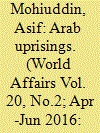

|
|
|
|
|
| Contents |
This article points out that the watershed events that initiated the period of contentious politics in the Arab world after 2010 not only reshaped regional and global politics but also challenged state power and long held theories dominant in the region, particularly about the popular acquiescence to regime control. They opened new areas of inquiry as well. By their impact on regional and international politics, these events have drawn the attention of scholars across the world. Some argue that these changes occurred as a result of the globalisation of democratic norms, new media technologies and regional structural changes, which led to widespread demonstrations, both violent and nonviolent. In calling for the downfall of the entrenched regimes, they signalled a breakdown of the social contract that had existed between the people and their rulers since independence.
|
|
|
|
|
|
|
|
|
|
|
|
|
|
|
|
| 2 |
ID:
173190
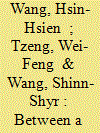

|
|
|
|
|
| Summary/Abstract |
In comparison to hegemony, lesser powers usually struggle for survival between two or more great powers under state power asymmetry, a perpetual phenomenon in international politics. With the rise of China and the increasingly strengthening role of the US in the Asia-Pacific region, it is important to learn how lesser powers manage their relations with the two. To explore this issue, we propose that the strength of state power will constrain the strategies of lesser powers as they choose between the US and China. Borrowing from existing theories and ideas on strategies that include balancing, bandwagoning, and hedging, we argue that the stronger a country’s power, the more likely it will choose a balancing strategy. At the same time, the weaker the country, the more likely that it will go with bandwagoning. Regional middle powers will show varied strategy choices, as they possess a higher degree of freedom in choosing which great power to side with. To validate these arguments, we construct two indicators — differences in trade dependence on the US and China and differences in the voting score consistent with the US and China — to quantify the strategies of lesser powers toward great powers and examine whether the variable of strategies follows the expected pattern. Our analysis shows that countries in the middle of the spectrum of state power demonstrated great freedom in choosing strategies toward the two powers.
|
|
|
|
|
|
|
|
|
|
|
|
|
|
|
|
| 3 |
ID:
141100
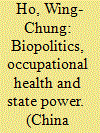

|
|
|
|
|
| Summary/Abstract |
This article endeavours to address the experience of Chinese workers with occupational disease as an instantiation of Agamben's notion of homo sacer – the ultimate biopolitical subject whose life is located outside the “normal” political, economic and cultural practices and, hence, is rendered largely silent and unintelligible in the public realm. It argues that the victimization of the occupationally sick worker has become almost a blind spot at the centre of governmentality insofar as the specific set of social regulations and power relations has created a “double ambivalence” among the victims who are constantly and disturbingly caught in between the public and private, the productive and unproductive, and the culturally normative and the culturally deviant. Such experiences of marginality contribute to the understanding of the biopolitical nature of contemporary Chinese state power, which adopts extensive “stability maintenance” (weiwen) measures to reduce resisters to a state of “bare life” susceptible to the rule of exception.
|
|
|
|
|
|
|
|
|
|
|
|
|
|
|
|
| 4 |
ID:
096537
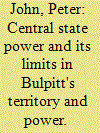

|
|
|
| 5 |
ID:
132215
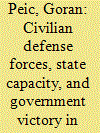

|
|
|
|
|
| Publication |
2014.
|
| Summary/Abstract |
Given the onset of a violent rebellion by an armed non-state group, how do states re-establish intra-state peace and hence fulfill their basic function as providers of internal security? In this article I argue that one way governments perform this core function is by recruiting non-combatants into local self-defense units called civilian defense forces (CDFs). By providing for local security, leveraging their superior local knowledge, and provoking insurgent reprisals against civilians, CDF units facilitate the influx of tactical intelligence as well as isolate insurgents from non-combatant populations physically as well as politically. Consistent with the argument, statistical analyses of two different cross-national data sets of insurgencies from 1944 to 2006 reveal that a state is 53 percent more likely to vanquish a guerrilla threat if the incumbent deploys CDFs. The analyses also cast doubt on a recent claim in the literature that incumbent force mechanization adversely affects the states' ability to counter insurgent threats. Given that CDF deployment is a more easily manipulable variable than most other elements of state power, CDFs appear to be an effective instrument of counterinsurgency deserving of further academic and policy attention.
|
|
|
|
|
|
|
|
|
|
|
|
|
|
|
|
| 6 |
ID:
184578
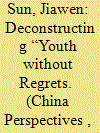

|
|
|
|
|
| Summary/Abstract |
Among the many slogans and descriptive terms concerning educated youth, “youth without regrets” occupies a special place. On the one hand, it is one of the earliest and best-known slogans about educated youth, and even became a cultural symbol of China in the 1990s. On the other hand, its initial association with educated youth and popularity actually reflect not so much a coincidence as a complicity between the popular and state narratives. This article thus analyses in depth the whole range of issues related to the slogan "youth without regrets": the social context and political reasons for its emergence, the process that led to its popularity, its real meaning, and the common misunderstandings surrounding it, as well as the social, cultural, and political functions hidden behind its popularity.
|
|
|
|
|
|
|
|
|
|
|
|
|
|
|
|
| 7 |
ID:
115230
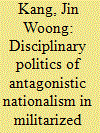

|
|
|
|
|
| Publication |
2012.
|
| Summary/Abstract |
After the Korean War (1950-53), the two militarized Koreas governed each and every member of society in similar ways through their disciplinary politics of antagonistic nationalism. The existing studies of state formation in the two Koreas have neglected an aspect of state power that was neither necessarily top-down nor violent from above but also reproduced from below. In both South and North Korea, especially from the 1960s to the 1970s, state power had internal dynamics that penetrated the day-to-day activities of most citizens and led them to actively accept and participate in nationalist rule. This article explores an understudied aspect of the two Koreas' state power that was disciplinarily diffused in people's everyday practices through reproduction of aggressive nationalism from below and the organic construction of the individual body and nation.
|
|
|
|
|
|
|
|
|
|
|
|
|
|
|
|
| 8 |
ID:
105024
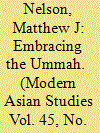

|
|
|
|
|
| Publication |
2011.
|
| Summary/Abstract |
Studies of student politics in Pakistan often focus on the competition between 'secular' and 'religious' student groups-for example, the leftward-leaning National Students Federation, regional parties with a broadly secular orientation like the Pakhtun Students Federation, the Islami Jamiat-e-Tuleba (Islamic Students Association), and sectarian groups like the (Shi'a) Imamia Students Organization. This paper describes the emergence of an increasingly violent stalemate between and amongst these groups since the 1960s. It then argues that for a growing number of students this stalemate produced a certain disenchantment with exclusionary efforts to control the 'state-based Muslim nationalism' that lay behind the formation of Pakistan itself. Seeking alternatives, these disenchanted students developed an interest in non-state-based forms of Muslim solidarity-forms that rejected the constraints of territorial Muslim nationalism in favour of transnational movements focused on the revitalization of Muslim solidarity on a truly global scale-movements like the (Deobandi) Tablighi Jama'at and the (Barelwi) Da'wat-e-Islami. Tracing this development, this paper takes up one application of Talal Asad's argument that alternative expressions of religion (and religious solidarity) are 'produced' by specific political circumstances. It also examines this formulation in the light of other theories that take an interest in the effects-indeed the potentially 'democratizing' effects-of protracted political stalemates.
|
|
|
|
|
|
|
|
|
|
|
|
|
|
|
|
| 9 |
ID:
138077
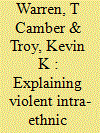

|
|
|
|
|
| Summary/Abstract |
Despite significant advances in the disaggregation of the study of civil conflict and intraethnic violence, intra-ethnic violence remains understudied. In this article, we present the first systematic, cross-national analysis of the conditions that promote violent, fragmentary conflict within politically active ethnic minorities. We propose a model of intra-ethnic conflict in which collective violence is produced by the interaction between subgroup entrepreneurs and the suppressive actions of the state. This two-level model predicts a curvilinear relationship between the relative size of an ethnic minority and its probability of experiencing large-scale intra-ethnic conflict. Additional hypotheses based on the proposed causal mechanism are also posited. These hypotheses are tested with data drawn from a global sample of politically active ethnic minorities, for the period 1990 through 2006, using a combination of parametric and semi-parametric regression techniques. The results strongly confirm the predicted curvilinear relationship while also demonstrating that the specific shape of this relationship shifts in predictable ways under varying social and political contexts.
|
|
|
|
|
|
|
|
|
|
|
|
|
|
|
|
| 10 |
ID:
097916
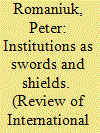

|
|
|
|
|
| Publication |
2010.
|
| Summary/Abstract |
International institutions are prominent in the 'global War on Terror'. But there remains variation in the institutionalisation of counter-terrorism, across policy domains and over time. I argue that institutions pursue tasks of counter-terrorism when they are backed by power. Institutions function as 'swords' as strong states seek to influence others. Weak states, too, are sensitive to the distributional consequences of cooperation and use institutions as 'shields' to resist the powerful. These claims are reflected in patterns of cooperation within the UN, and in terrorist financing and maritime security. Looking forward, multilateral counter-terrorism may remain contingent upon state power.
|
|
|
|
|
|
|
|
|
|
|
|
|
|
|
|
| 11 |
ID:
085197
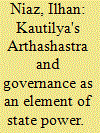

|
|
|
|
|
| Publication |
2008.
|
| Summary/Abstract |
The Indian subcontinent has long been subjected to invasions and extended
periods of warlordism, fragmentation and anarchy. The success of the invading
powers has often depended a great deal upon the prevalence of internal
dissolution. There is a direct link, for instance, between the collusion of certain
Afghan notables, such as the governor of the Punjab, Daulat Khan Lodhi, and the
establishment of Mughal imperial rule in the subcontinent in the 1520s. One can
|
|
|
|
|
|
|
|
|
|
|
|
|
|
|
|
| 12 |
ID:
164525
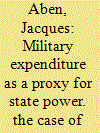

|
|
|
|
|
| Summary/Abstract |
This paper attempts to build a simple indicator of state power. Military expenditure is the paper’s point of departure, with the definitions given by NATO, SIPRI and others. This definition is discussed and a power version is build, using French budgetary data. Then a defence of the result against traditional or non-traditional critics is presented under an imperative of action. Finally, this concept is enlarged and a new concept of power expenditures is given, one more time using French budgetary data. The conclusion is that this large expenditure concept is an unbiased but imperfect indicator of the will to act, and has to be completed by GDP to indicate the capability to act in the long-run.
|
|
|
|
|
|
|
|
|
|
|
|
|
|
|
|
| 13 |
ID:
131487
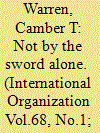

|
|
|
|
|
| Publication |
2014.
|
| Summary/Abstract |
Scholars of civil conflict have long recognized the importance of state strength in the suppression of nascent insurgencies. However, previous empirical investigations have generally focused on the material and coercive dimensions of state power, obscuring the critical role played by the generation of widespread voluntary compliance through processes of political communication, that is, the production of "soft power." In contrast, in this article I focus on a factor-mass communication technology-that can enhance state capacity only by strengthening the state's ability to broadly and publicly disseminate political messages. I argue that the enhanced capacities for large-scale normative influence generated by mass communication technologies can be expected to produce substantial barriers to the mobilization of militarized challenges to state rule, by strengthening economies of scale in the marketplace of ideas. Utilizing newly compiled cross-national data on mass media accessibility in the post-World War II period, I show that densely constituted mass media systems dramatically reduce the probability of large-scale civil violence, thereby providing new evidence for the fundamental importance of nonmaterial state capacities in the suppression of internal armed conflicts.
|
|
|
|
|
|
|
|
|
|
|
|
|
|
|
|
| 14 |
ID:
155933
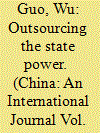

|
|
|
|
|
| Summary/Abstract |
This article reconstructs the origins, typology and implications of extrajudicial incarceration as a political phenomenon during the Cultural Revolution. It analyses the “cowshed” based on its various founders and functions at different stages of the Cultural Revolution, and argues that the Party committees, the People’s Liberation Army (PLA) and the revolutionary committees, i.e. the arms of the state, played a role no less significant than student Red Guards in confining and torturing innocent people. The article emphasises that the cowshed was distinct for its pervasive, decentred, arbitrary and spontaneous characteristics; however, the exertion of direct popular justice without formal intermediation in China was an alternative form of state violence through outsourcing the state power.
|
|
|
|
|
|
|
|
|
|
|
|
|
|
|
|
| 15 |
ID:
133245
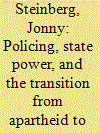

|
|
|
|
|
| Publication |
2014.
|
| Summary/Abstract |
With some exceptions, scholarship on post-apartheid policing has been too preoccupied by continuities with the apartheid era. While this is understandable, it has blinded scholars to profound changes. I argue that what has changed most since the end of apartheid is the relationship between policing and political order. During the late apartheid era, the structure and ethos of the South African Police was animated by the task of containing an insurgency. In the democratic era, policing is increasingly animated by the task of managing conflict in the ruling party. The difference is profound and the implications ripple right to the edges of the police organization, fashioning the manner in which street life is policed and impinging on the functioning and the durability of the detective service. The article concludes by arguing that instruments used in the past survive only when agents in the present find them useful, and that accounts of continuity need to train their analytical attention on the politics of the here and now.
|
|
|
|
|
|
|
|
|
|
|
|
|
|
|
|
| 16 |
ID:
047029
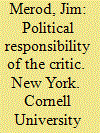

|
|
|
|
|
| Publication |
New York, Cornell University Press, 1987.
|
| Description |
xi, 267p.Hbk
|
| Standard Number |
080141976X
|
|
|
|
|
|
|
|
|
|
|
|
Copies: C:1/I:0,R:0,Q:0
Circulation
| Accession# | Call# | Current Location | Status | Policy | Location |
| 044404 | 801.95/MER 044404 | Main | On Shelf | General | |
|
|
|
|
| 17 |
ID:
121257
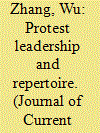

|
|
|
|
|
| Publication |
2013.
|
| Summary/Abstract |
Based on detailed ethnographic fieldwork, this paper compares two cases of peasant protest against heavy taxes and fees in a
northern Hunan county in the 1990s. It argues that peasant protest did
not arise spontaneously. Rather, it erupted when leaders emerged who
used central policy documents on lowering peasant taxes and fees to
mobilise peasants. Protest leaders were articulate and public-spirited
peasants who had received political training from the local party-state.
Furthermore, the number of leaders, their education level, and their relationship with the local party-state explain why the repertoire and the
scope of the two protests varied. Protests led by less educated veteran
Communist Party cadres tended to be milder and smaller than those led
by better-educated peasants more distant from the local party-state. This
paper helps us to understand the process of peasant mobilisation in contemporary China and explains why peasant protest varies across cases.
|
|
|
|
|
|
|
|
|
|
|
|
|
|
|
|
| 18 |
ID:
173202
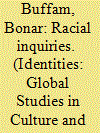

|
|
|
|
|
| Summary/Abstract |
Critical race scholarship has effectively documented how the legal institutions of liberal democratic states figure as both mechanisms of systemic racism and avenues of redress against these forms of power. This article offers new insights into the racial effects of these legal institutions by examining the epistemic dynamics of a Canadian public inquiry that was tasked with investigating why state institutions failed to prevent and successfully prosecute the bombings of two Air India flights, which investigators attributed to Sikh nationalist groups operating in Canada. Through a discourse analysis of documents generated during the inquiry, I track how its complex epistemic dynamics precluded recognition of the racial effects of Canadian state institutions. Approaching the inquiry as an instrument of juridical knowledge production and mechanism of political accountability, this article tracks the contingent processes through which liberal epistemologies of race are validated by state actors to extend race’s systemic conditions of existence.
|
|
|
|
|
|
|
|
|
|
|
|
|
|
|
|
| 19 |
ID:
061836
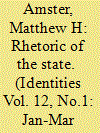

|
|
|
|
|
| Publication |
Jan-Mar 2005.
|
|
|
|
|
|
|
|
|
|
|
|
|
|
|
|
| 20 |
ID:
081868
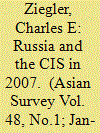

|
|
|
|
|
| Publication |
2008.
|
| Summary/Abstract |
Russia in 2007 moved further away from a constitutional order governed by the rule of law as President Vladimir Putin's second term drew to a close and the country prepared for parliamentary and presidential elections. High oil and gas prices buoyed the economy, but little progress was made in addressing Russia's serious social problems. In foreign policy, confrontation with the West was balanced by excellent relations with most of Asia
|
|
|
|
|
|
|
|
|
|
|
|
|
|
|
|
|
|
|
|
|